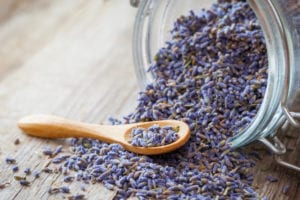Written by Tatjana Djakovic, Staff Writer. Lavender aromatherapy significantly reduced menopausal symptoms in the 100 participating menopausal Iranian women.
 The most common symptoms experienced by 80% of women in menopause include flushing, night sweats, fatigue, irritability and mood swings 1. Alternative methods for easing menopausal symptoms have gained popularity in recent times, due to the presence of undesirable side-effects of conventional hormone replacement therapy 2. An alternative method that may be effective in reducing menopausal symptoms is lavender aromatherapy, which is a volatile oil or aroma extracted from the lavender plant. Lavender is also used to reduce anxiety, as a sedative agent and for the treatment of sleep disorders 3.
The most common symptoms experienced by 80% of women in menopause include flushing, night sweats, fatigue, irritability and mood swings 1. Alternative methods for easing menopausal symptoms have gained popularity in recent times, due to the presence of undesirable side-effects of conventional hormone replacement therapy 2. An alternative method that may be effective in reducing menopausal symptoms is lavender aromatherapy, which is a volatile oil or aroma extracted from the lavender plant. Lavender is also used to reduce anxiety, as a sedative agent and for the treatment of sleep disorders 3.
The recent three-month, double-blind, cross over, Iranian study involved 100 menopausal women, aged 45 to 55 years, who were randomized to either an intervention group (n=50) that was given lavender essence to smell twice daily per week for 20 minutes or a placebo group (n=50) that smelled diluted milk, which was the same color, form and size. Participants in each group filled out a standard Green questionnaire which assessed the severity of their menopause symptoms. The Greene questionnaire allows a women to judge the severity of her symptoms by assigning a score of 3 for severe, 2 for moderate, 1 for mild and 0 for no symptom. The scores are added, and a score of above 15 indicates an estrogen deficiency 4. After two weeks of therapy and a four week washout, the two groups switched roles and once again completed the Green questionnaire to assess their menopausal symptoms.
In this study, all the women prior to treatment had a cumulative Greene score of 15 to 45, representing the presence of menopausal symptoms. Data showed a significant reduction in menopausal symptoms before and after treatment (p=0.000). Menopausal symptoms in the lavender aromatherapy group had a significant decrease compared to control group as indicated by average mean differences between groups (p=0.000). In particular, anxiety decreased by 0.979 points, depression by 0.592 points, physical signs by 0.748 points, vasomotor signs by 0.232 points and sexual desire by 0.129 points (p=0.00) 5.
The results of the study indicated a significant decrease in menopausal symptoms with the use of lavender oil. Limitations of the study included the absence of menopausal surveys done before and after the intervention, and citing only the mean differences of the symptom scores. In addition, the number and ethnicity of women participating in the study was not representative of the whole population. Furthermore, researchers only collected data through a survey and not by blood tests which might have shown a correlation between lavender oil and estrogen levels. Nonetheless, the study is a good starting point to show that there are alternative methods such as lavender oil aromatherapy available to women for the treatment of menopausal symptoms.
Source: Nikjou, Roya, Rafat Kazemzadeh, Firoozeh Asadzadeh, Razzag Fathi, and Farideh Mostafazadeh. “The Effect of Lavender Aromatherapy on the Symptoms of Menopause.” Journal of the National Medical Association (2017).
© 2017 Published by Elsevier Inc. on behalf of the National Medical Association.
Posted August 28, 2017.
Tatjana Djakovic, MS, graduated from Roosevelt College in 2011, with concentration in biochemistry. Her research was in determining antioxidants and macronutrients in herbal teas. She is originally from Gospic, Croatia and currently resides in Carol Stream, IL.
References:
- Sierra, Bresilda, Luis A. Hidalgo, and Peter A. Chedraui. “Measuring climacteric symptoms in an Ecuadorian population with the Greene Climacteric Scale.” Maturitas 51.3 (2005): 236-245.
- Mohammad, Kazem, Seyed Mehdi Sadat Hashemi, and Farideh Khalaj Abadi Farahani. “Age at natural menopause in Iran.” Maturitas 49.4 (2004): 321-326.
- Herz, Rachel S. “Aromatherapy facts and fictions: a scientific analysis of olfactory effects on mood, physiology and behavior.” International Journal of Neuroscience 119.2 (2009): 263-290.
- Greene, John Gerald. “Constructing a standard climacteric scale.” Maturitas29.1 (1998): 25-31.
- Nikjou, Roya, et al. “The Effect of Lavender Aromatherapy on the Symptoms of Menopause.” Journal of the National Medical Association (2017).
